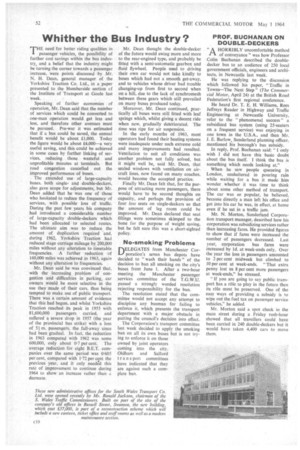Whither the Bus Industry?
Page 54

If you've noticed an error in this article please click here to report it so we can fix it.
THE need for better riding qualities in passenger vehicles, the possibility of further cost savings within the bus industry, and a belief that the industry might be turning the corner towards a passenger increase, were points discussed by Mr. N. H. Dean, general manager of the Yorkshire Traction Co. Ltd., in a paper presented to the Humberside section cf the Institute of Transport at Goole last week.
Speaking of further economies of operation, Mr. Dean said that the number of services which could be converted to one-man operation would get less and less, and therefore other avenues must be pursued. Pre-war it was estimated that if a bus could be saved, the annual benefit would be about £1,000. Today the figure would be about f4,000—a very useful saving, and this could be achieved in some cases by further linking of services, reducing those wasteful and unprofitable minutes at terminals. But road congestion cancelled out the improved performance of buses.
The extended use of large-capacity buses, both singleand double-deckers, also gave scope for adjustments, but Mr. Dean added that he was one of those who hesitated to reduce the frequency of services, with possible loss of traffic. During the past few years his company had introduced a considerable number of large-capacity double-deckers which had been allocated to selected routes. The ultimate aim was to reduce the amount of duplication required and, during 1962, Yorkshire Traction had reduced stage carriage mileage by 200,000 miles without any alteration to timetable frequencies. A further reduction of 160,000 miles was achieved in 1963, again without any alteration to frequencies.
Mr. Dean said he was convinced that, with the increasing problem of congestion and difficulties in parking, car owners would be more selective in the use they made of their cars, thus being tempted to make use of public transport. There was a certain amount of evidence that this had begun, and whilst Yorkshire Traction reached its peak in 1955 with 81,600,000 passengers carried, and suffered a severe drop in 1957 (the year of the provincial bus strike) with a loss of 54:m. passengers, the fall-away since had been gradual. In fact, the reduction in 1963 compared with 1962 was some 600,000, only about 07 per cent. The average reduction for eight B.E.T. companies over the same period was 0-605 per cent, compared with 1-72 per cent the previous year, and it only neeed this rate of improvement to continue during 1964 to show an increase rather than a decrease. Mr. Dean thought the double-decker of the future would swing more and more to the rear-engined type, and probably be fitted with a semi-automatic gearbox and fluid flywheel. People used to driving their own car would not take kindly to buses which had not a smooth get-away, and to vehicles whose driver had trouble changing-up from first to second when on a hill, due to the lack of synchromesh between these gears which still prevailed on many buses produced today.
Moreover, Mr. Dean continued, practically all buses were still fitted with leaf springs which, whilst giving a decent ride when new, gradually deteriorated. The time was ripe for air suspension. .
In the early months of 1963, most operators had found their heating systems were inadequate under such extreme cold and many improvements had resulted. Ventilation to suit all conditions was another problem not fully solved, but it might well be, said Mr. Dean, that sealed windows with ventilation on aircraft lines, now found on many coaches, would become the accepted practice.
Finally Mr. Dean felt that, for the purpose of attracting more passengers, there would have to be second thoughts on capacity, and perhaps the provision of four less seats on single-deckers so that the amount of leg room could be improved. Mr. Dean declared that seat fillings were sometimes skimped to the bone for the purpose of weight saving, but he felt sure this was a short-sighted policy.
No-smoking Problems DELEGATES from Manchester Corporation's seven bus depots have decided to "wash their hands" of the decision to ban all smoking on the city's buses from June 1. After a two-hour meeting the Manchester passenger services committee of the T.G.W.U. passed a strongly worded resolution rejecting responsibility for the ban.
The resolution stated that the committee would not accept any attempt to discipline any busman for failing to enforce it, which presents the transport department with a major obstacle in putting the council's decision into effect.
The Corporation's transport committee last week decided to apply the smoking ban on all its own buses but is not trying to enforce it on those owned by joint operators coming into the city. Oldham and Salford tra n s port committees have indicated that they are against such a complete ban.




















































































































































































































































